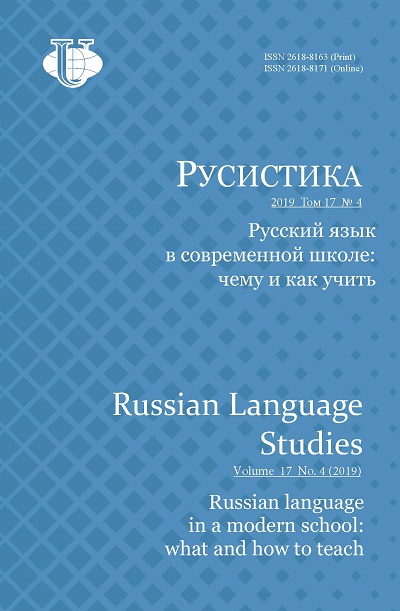Semantic shifts in verbalization of the ethical concept “boon” in electronic mass-media
- Authors: Dmitriyeva N.M.1, Prosvirkina I.I.1
-
Affiliations:
- Orenburg State University
- Issue: Vol 17, No 4 (2019): RUSSIAN LANGUAGE IN A MODERN SCHOOL: WHAT AND HOW TO TEACH
- Pages: 502-514
- Section: Key Issues of Russian Language Research
- URL: https://journals.rudn.ru/russian-language-studies/article/view/22438
- DOI: https://doi.org/10.22363/2618-8163-2019-17-4-502-514
- ID: 22438
Cite item
Full Text
Abstract
The relevance of the article is conditioned by the specific role of the Internet space nowadays. The authors analyze the changes of ethical semantics of the concept “boon” on the material of lexical units in modern electronic mass-media compared with the semantic field represented in explanatory dictionaries. On the material of explanatory dictionaries of Old Church Slavonic and Russian languages the authors conducted a diachronic analysis, described ethical semantic components of the concept, pointed out always actual meanings “kindness”, “gifts of the Holy Spirit”, “love”, “mercy”, “benefaction”. The novelty of the article is in pointing out the changes in the name of the concept - lexeme “boon”. The authors showed that abstract senses are increasing in its semantics - “everything, that is good”. But in the end of the XXth ethical senses actualize again, the senses which were characteristic for the concept in Old Russian period and were ideologically deactualized in the beginning and in the middle of the century. The analysis of modern electronic mass-media, which greatly influence national consciousness nowadays, showed that in this material the lexeme “boon” appears to be semantically incomplete, realizes additional function and only historically reminds us of one of the most important concepts of Russian language worldview. Therefore, we need “ethical censorship” in relation to the words verbalizing significant concepts of Russian mentality. The results of the research can be used in creating texts of different styles and genres for mass-media, in teaching Russian (as a non-native and native language), in releasing forensic linguistic expertise.
About the authors
Natalya M. Dmitriyeva
Orenburg State University
Author for correspondence.
Email: dmitrieva1977@yandex.ru
Candidate of Philological Sciences, Docent, Associate Professor at the Department of Russian philology and methods of teaching Russian at the Faculty of Philology
13 Pobedy Avenue, Orenburg, 460018, Russian FederationIrina I. Prosvirkina
Orenburg State University
Email: prosvirkina.irina@yandex.ru
Doctor of Pedagogic Sciences, Docent, Professor at the Department of Russian philology and methods of teaching Russian at the Faculty of Philology
13 Pobedy Avenue, Orenburg, 460018, Russian FederationReferences
- Apresyan, R.G. & Guseinov, A.A. (Eds.). (2001). Etika: Entsiklopedicheskii slovar’ [Ethics: Encyclopedic Dictionary]. Moscow: Gardariki Publ. (In Russ.).
- Chernyshev, V.I. (Ed.). (1950). Slovar’ sovremennogo russkogo literaturnogo yazyka [The Dictionary of Modern Russian Literary Language]. Moscow: AN SSSR Publ. (In Russ.).
- Dem’yankov, V.Z. (2007). The term “concept” as an element of terminological culture. Language as a matter of meaning (pp. 606—622). Moscow: Azbukovnik Publ. (In Russ.).
- Dem’yankov, V.Z. (2017). Knowledge Transfer and Cognitive Manipulation. Questions of cognitive linguistics, 4 (053), 5—13. (In Russ.).
- D’yachenko, G. (2001). Polnyi tserkovno-slavyanskii slovar’ [Complete Church Slavonic Dictionary]. Moscow: Otchii dom Publ. (In Russ.).
- Efremova, T.F. (2005). Sovremennyi tolkovyi slovar’ russkogo yazyka [Modern explanatory dictionary of the Russian language]. Moscow: AST Publ., Astrel’ Publ., Kharvest Publ., Lingua Publ. (In Russ.).
- Evgen’eva, A.P. (Ed.). (1985). Slovar’ russkogo yazyka [Dictionary of the Russian language]. Moscow: Russian Language Publ. (In Russ.).
- Karasik, V.I. (2015). Yazykovaya spiral’: tsennosti, znaki, motivy [Language Spiral: Values, Signs, Motives]. Volgograd: Paradigma Publ. (In Russ.).
- Kolesov, V.V. (2006). Russkaya mental’nost’ v yazyke i tekste [Russian mentality in language and text]. Saint-Petersburg: Peterburgskoe Vostokovedenie Publ. (In Russ.).
- Maslova, V.A. (2018). The main trends and principles of modern linguistics. RUDN Journal of Russian and Foreign Languages Research and teaching, 16(2), 172—190. (In Russ.).
- Ozhegov, S.I. (2005). Slovar’ russkogo yazyka [Russian language dictionary]. Moscow: Oniks Publ., Mir i Obrazovanie Publ. (In Russ.).
- Popova Z.D. & Sternin I.A. (2007). Kognitivnaya linvgistika [Cognitive linguistics]. Moscow: AST: East — West Publ. (In Russ.).
- Shaklein, V.M. (2012). Istoricheskaya lingvokul’turologiya teksta [Historical linguoculturology of the text]. Moscow: RUDN Publ. (In Russ.).
- Shaklein, V.M., Belova, M.A. & Mikova, S.S. (2019). Creolized text in the media: principles of efficient decoding. Theoretical and Practical Issues of Journalism, (8), 147—163. (In Russ.).
- Slovar’ russkogo yazyka XI—XVII vv. [Dictionary of the Russian language XI–XVII centuries]. (1975). Moscow: Nauka Publ. (In Russ.).
- Slyshkin, G.G. (2000). Lingvokul’turnye kontsepty pretsedentnykh tekstov v soznanii i diskurse [Linguocultural concepts of case texts in consciousness and discourse]. Moscow: Akademiya Publ. (In Russ.).
- Sreznevskii, I.I. (1983). Materialy dlya slovarya drevnerusskogo yazyka po pis’mennym pamyatnikam [Materials for the dictionary of the Old Russian language on written records]. Saint-Petersburg. (In Russ.).
- Ushakov, D.N. (2010). Tolkovyi slovar’ sovremennogo russkogo yazyka [Explanatory dictionary of modern Russian language]. Moscow: Dom XXI century Publ. (In Russ.).
- Vasil’eva, G.M. & Kharchenkova, L.I. (2013). Change of value preferences of Russians and its reflection in the linguistic consciousness. Dialogue of cultures: values, meanings, communication (pp. 279—280). Saint-Petersburg. (In Russ.).
- Vendina, T.I. (2002). Srednevekovyi chelovek v zerkale staroslavyanskogo yazyka [Medieval human in the mirror of the old Slavonic language]. Moscow: Indrik Publ. (In Russ.).
- Vorob’ev, V.V. (1997). Lingvokul’turologiya (teoriya i metody) [Linguoculturology (theory and methods)]. Moscow: RUDN Publ. (In Russ.).
- Zaliznyak, A.A. & others. (2005). Kl’uchevye idei russkoi yazykovoi kartiny mira [The main ideas of the Russian language picture of the world]. Moscow: The Slavic culture languages Publ. (In Russ.).
Supplementary files














